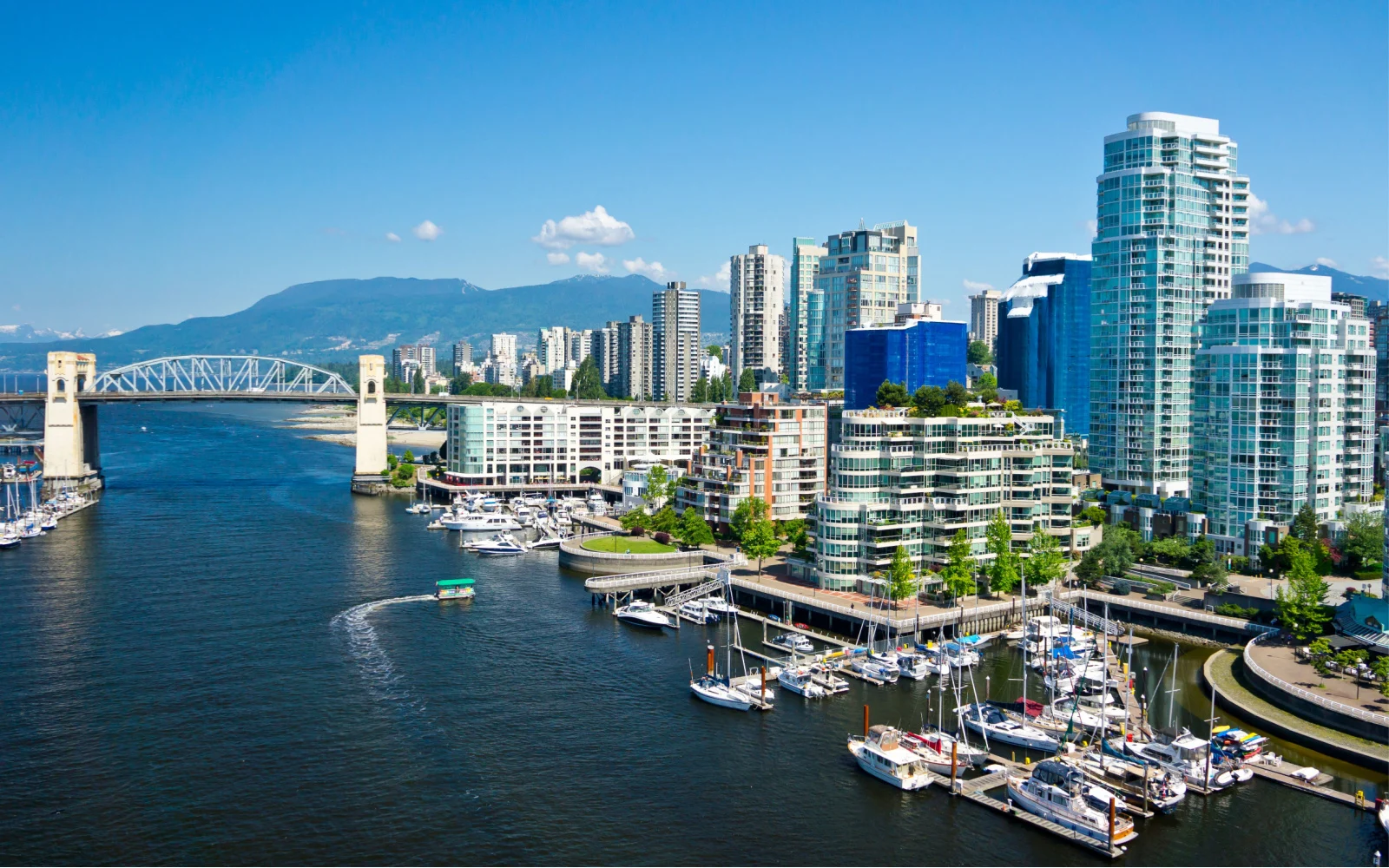What's the best time to visit Vancouver?
The best time to visit Vancouver is between May and September, when the weather is warm and rain is scarce, perfect for outdoor adventures. This period features the city’s driest months and hosts major events like the Vancouver International Jazz Festival.
Although summer is peak tourist season, it’s an ideal time for experiences like whale watching and exploring vibrant neighborhoods, ensuring a lively visit filled with cultural and natural attractions.
The city of Vancouver is one of the best places to go in Canada. It’s a modern, multicultural metropolis with plenty to see and a great base for exploring the beautiful nature of British Columbia. Check out some of Vancouver’s most famous attractions, such as the world-renowned Vancouver Aquarium.
Sample the multicultural heritage of Vancouver at the Richmond Night Market and its many ethnic restaurants.
You can even do plenty of nature-based activities from the city itself, from going on a whale-watching tour to taking a cable car to the top of Grouse Mountain. But what’s the best time to visit Vancouver? We’ll show you this and more below.
The Overall Best Time to Visit Vancouver
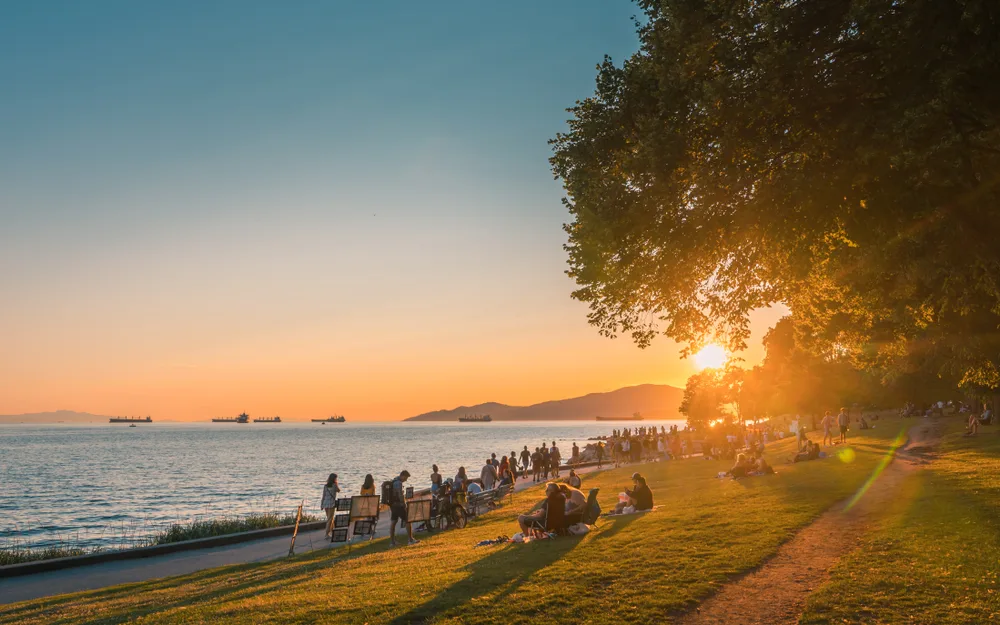
Vancouver BC Canada,June 2019.Vancouver beach summer sunset/LeonWang/Shutterstock
The overall best time to visit Vancouver is from May to September when the weather is at its warmest and you have the least chance of getting caught in the rain. Although Vancouver is in Canada, it actually has a mild climate thanks to the maritime effect of the Pacific Ocean.
Its winters are mild and cool, while its summers are warm. The only downside is that the maritime effect also means Vancouver gets a lot of rain. If you’re hoping to spend a lot of time outdoors, summer is the best time to visit.
According to the official Vancouver city website, July and August are the driest months, meaning that you have a good chance of sunny skies. Temperatures during the peak summer months tend to be in the low 70s, not too hot but still pleasant.
The weather is perfect for outdoor activities, such as:
- Hiking
- Kayaking
- Camping
- Swimming (if you’re brave)
During the warmer months, wildlife around Vancouver is at its most active, meaning that you have better chances of spotting unique animals.
According to the Vancouver tourism board, whale-watching season is between March and October, with orca season peaking in the summer. Many popular cultural events are also seasonal if they are held outdoors.
The Richmond Night Market, a street food destination featuring many Asian delicacies, only runs between April and October. It would be a shame to miss this quintessential Vancouver experience. The city’s most popular festivals also run in the summer.
Popular summer events include:
- Vancouver International Jazz Festival (June–July)
- Canada Day (July 1st)
- Celebration of Light fireworks festival (July)
- Vancouver Pride (July)
However, the most special thing during your visit to Vancouver may not be a special event. Just enjoying an al fresco meal or strolling through the pleasant neighborhoods such as Gastown is at its best during the warm summer months.
Just remember that you won’t be the only one with the same idea. Summer is the most popular season to visit Vancouver, both for overnight visitors and for cruise ship passengers.
Cheapest Time to Visit Vancouver
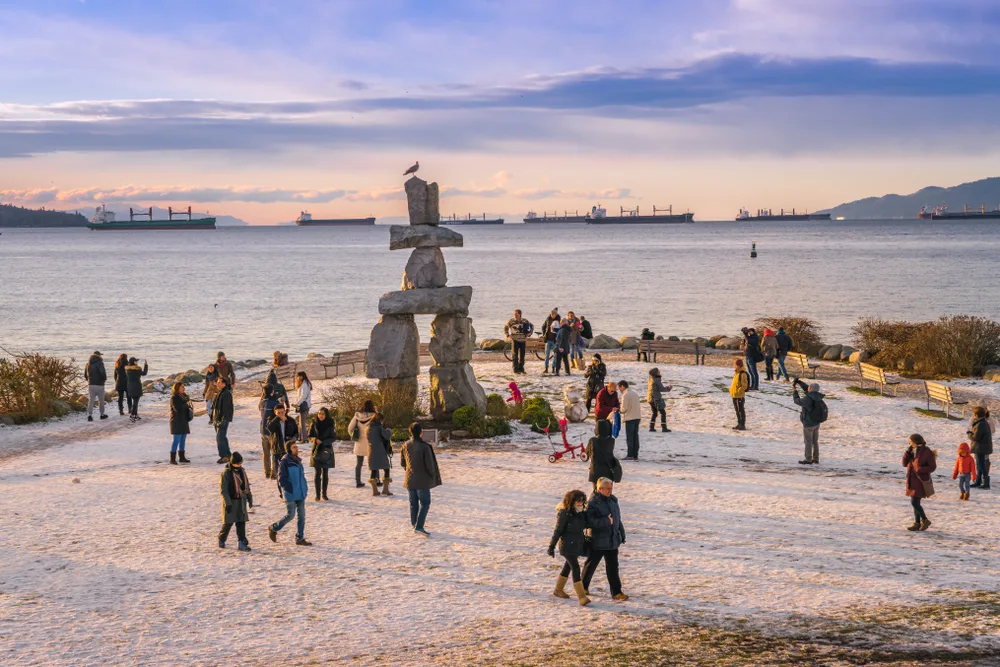
Vancouver British Columbia Canada,January 2017. people visiting Inukshuk Vancouver at English bay beach,Canada/LeonWang/Shutterstock
The absolute cheapest time to visit Vancouver is during the winter, but you can also find good deals during the spring. Vancouver receives far fewer visitors in the winter, so many hotels tend to lower their rates to try to attract at least some guests in the off-season.
If you shop around, you can find some hotels offering discounts of up to 20% compared to peak rates. Cheaper prices last well into spring, until about mid-May.
You can still find discounts of 20%–40% in April. The spring is also a good time to fly into Vancouver, as March, April, and May tend to offer the lowest flight rates.
Spring is the sweet spot for visiting the city since you can save money on your trip compared to visiting during peak season but still enjoy some good weather. The trees are beginning to blossom, and now is a good time to visit the botanical garden.
The whale-watching season also begins in March, and you may be able to get lower rates on a whale-watching cruise than you would find in the summer. When booking a vacation with the goal of saving money, just make sure that you avoid any holiday weekends.
Holidays such as Easter tend to bring more visitors and higher prices. Any time of year you visit, a weekday stay will be cheaper than the weekend.
Least Busy Time to Visit Vancouver
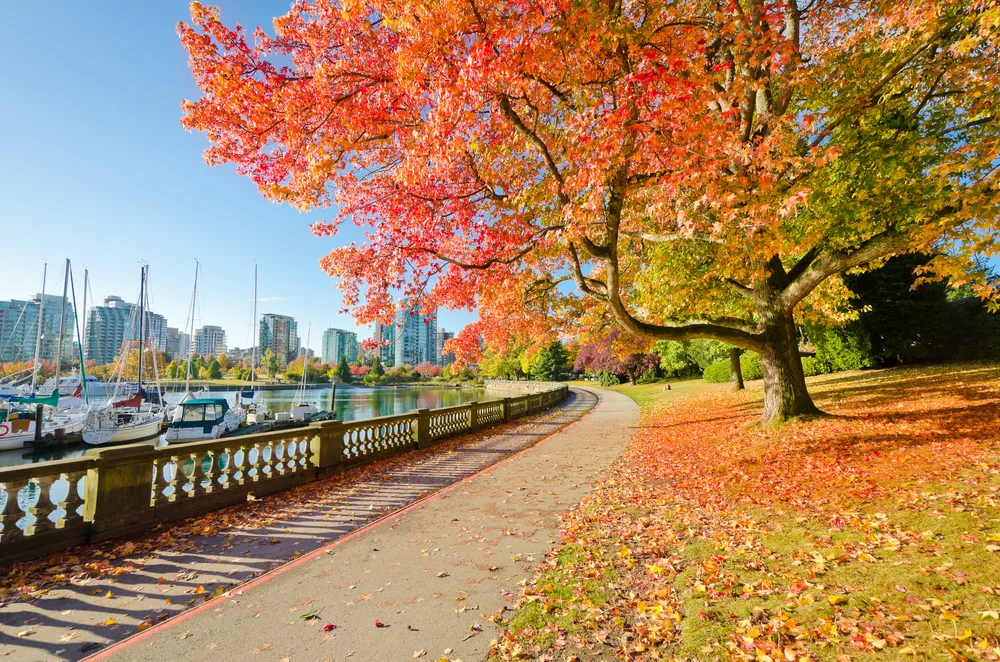
Romakoma/Shutterstock
While winter is the least busy time to visit Vancouver, fall is the best time to visit if you want to enjoy good weather and still beat the crowds. Many tourists don’t know this well-kept secret, but summer in Vancouver lasts well into September.
You can still enjoy plenty of sunny days and warm temperatures, perfect for hiking in the nearby mountains. October is cooler and rainier but still has some nice days.
Many seasonal activities, such as the night market, remain open until mid-October. Fall is a great time to explore the outdoors around Vancouver. The air is crisp and perfect for hiking. The leaves are spectacular as they change color.
Even if all that you do is explore Stanley Park, that is still a great time to visit the city. Plus, fall doesn’t have as many high-profile festivals as other seasons that attract crowds of visitors.
Most events tend to be geared toward locals or celebrating culture, such as the Vancouver Writers Fest (usually held in October). This is a great season to check out the rich cultural offerings of the city.
Worst Time to Visit Vancouver
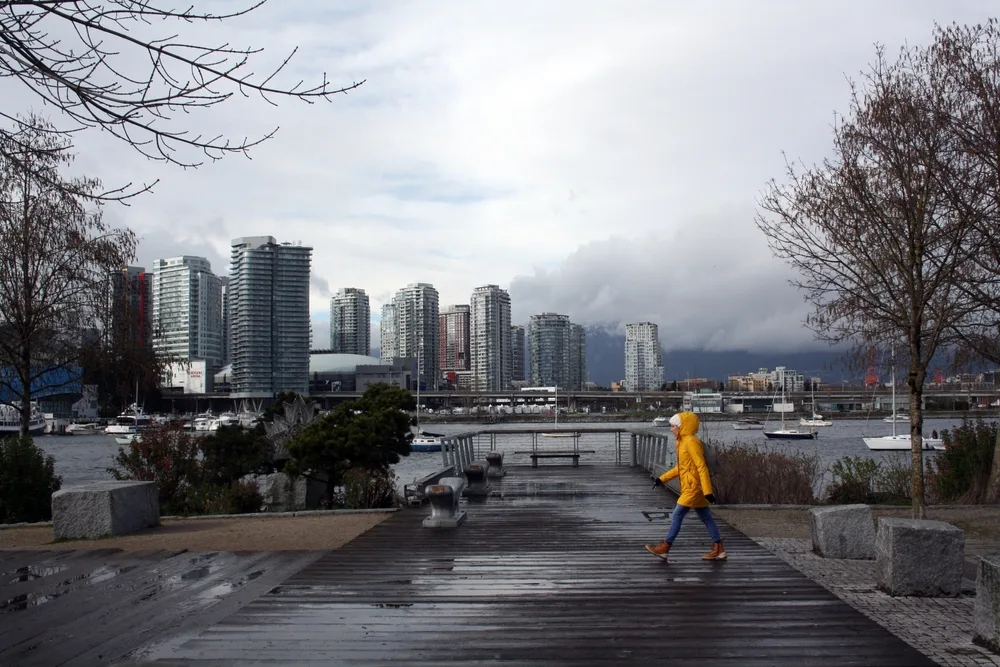
Wirestock Creators/Shutterstock
The worst time to visit Vancouver is during the winter when the chilly, damp weather makes it difficult to enjoy any outdoor activities. Vancouver’s weather doesn’t get as cold as the rest of Canada.
Winter temperatures tend to be just above freezing, in the 30s and 40s on the Fahrenheit scale. However, winter also brings rain. While the weather is wet all year round, it rains the most in November and December, and January and February are not far behind.
Hiking during persistent, driving rain is not most people’s idea of a good time. Many outdoor activities also shut down during the winter, such as outdoor markets.
Most animals go into hibernation, and whale-watching season is officially over. However, you can still walk around Vancouver as long as you prepare with the right clothing—after all, the locals have to do it!
The tourism board recommends warm layers, a raincoat, an umbrella, and waterproof boots. Alternatively, you can use this time to explore Vancouver’s indoor activities. The city has many amazing museums, such as the Museum of Anthropology at the University of British Columbia.
This season is also one of the best times to visit if you want to check out the city’s spectacular food culture, thanks to shorter lines at restaurants and events such as Dine Out Vancouver (January). Winter is also the best time to visit for winter sports.
The mountains near Vancouver are covered in snow, and the good powder draws skiers and snowboarders from all over the world. Hockey lovers will want to catch a Vancouver Canucks game—hockey season lasts from mid-October to mid-April.
Vancouver by Month: Climate & Activities
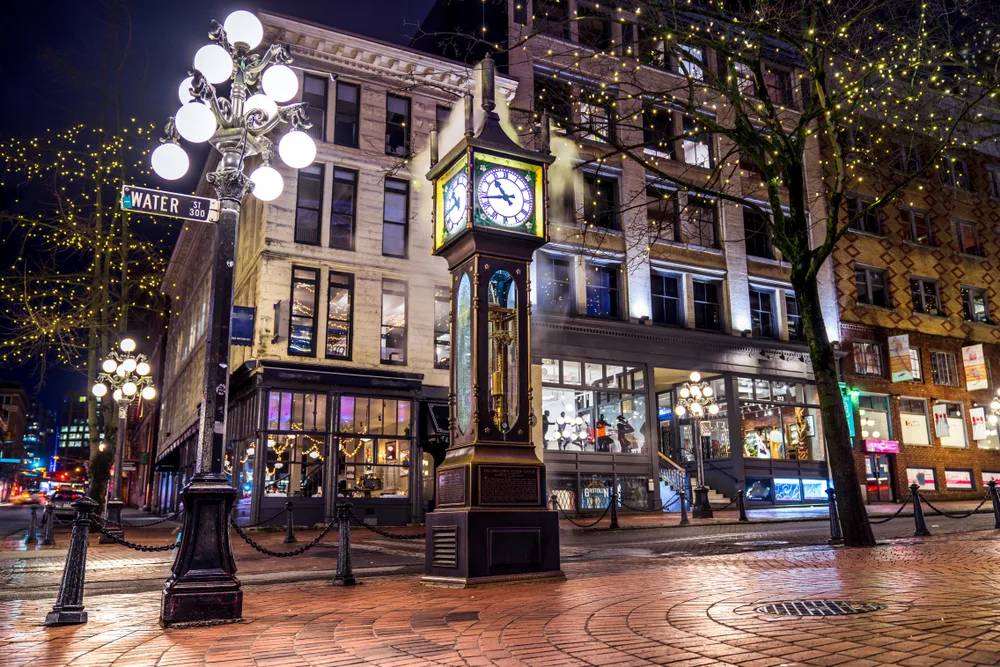
Daniel Avram/Shutterstock
Still unsure about the best time to visit Vancouver? Take a look at our summary of the weather and climate by month below:
January
Winter temperatures in Vancouver range from 1 to 7°C (34-45°F). It’s an ideal time for skiing and snowboarding on nearby mountains, exploring Stanley Park’s winter landscapes, and enjoying indoor cultural events.
February
Similar to January, February maintains cool temperatures between 1 to 8°C (34-46°F). Visitors can experience winter festivals like the Vancouver International Mountain Film Festival, visit the Vancouver Art Gallery, and enjoy winter sports.
March
As spring begins, temperatures range from 3 to 11°C (37-52°F). March is perfect for cherry blossom viewing in neighborhoods like Kitsilano, hiking in Pacific Spirit Regional Park, and attending events like the Vancouver International Dance Festival.
April
Spring temperatures in Vancouver range from 6 to 14°C (43-57°F). It’s an ideal time for exploring the Vancouver Aquarium, visiting the Vancouver Cherry Blossom Festival, and enjoying the blooming flowers in VanDusen Botanical Garden.
May
In May, Vancouver sees temperatures ranging from 9 to 17°C (48-63°F). It’s a great month for outdoor activities, including cycling around the seawall, exploring Grouse Mountain, and attending the Vancouver International Children’s Festival.
June
Summer arrives with temperatures between 12 to 20°C (54-68°F). June offers opportunities for kayaking in False Creek, attending outdoor concerts and festivals, and exploring the diverse neighborhoods of Vancouver.
July
In July, Vancouver maintains mild temperatures from 14 to 23°C (57-73°F). It’s a popular month for beach days at English Bay, hiking the Grouse Grind, and enjoying the Vancouver Folk Music Festival.
August
Temperatures in August range from 14 to 23°C (57-73°F). It’s an excellent time for exploring Granville Island, attending the Celebration of Light fireworks festival, and taking day trips to nearby Whistler.
September
As fall begins in September, Vancouver’s temperatures range from 11 to 18°C (52-64°F). September offers a pleasant transition, with opportunities for hiking in Lynn Canyon Park, attending the Vancouver International Film Festival, and enjoying fall foliage.
October
October sees temperatures ranging from 8 to 14°C (46-57°F). It’s a great month for visiting the Capilano Suspension Bridge Park, exploring the Museum of Anthropology, and attending Halloween events.
November
Fall temperatures range from 5 to 10°C (41-50°F). November is perfect for exploring the Vancouver Maritime Museum, enjoying fall colors in Queen Elizabeth Park, and attending the Vancouver Christmas Market.
December
Winter returns with temperatures ranging from 2 to 7°C (36-45°F). December brings opportunities for holiday shopping on Robson Street, experiencing festive events like the Festival of Lights at the VanDusen Botanical Garden, and enjoying winter sports on nearby mountains.
Frequently Asked Questions
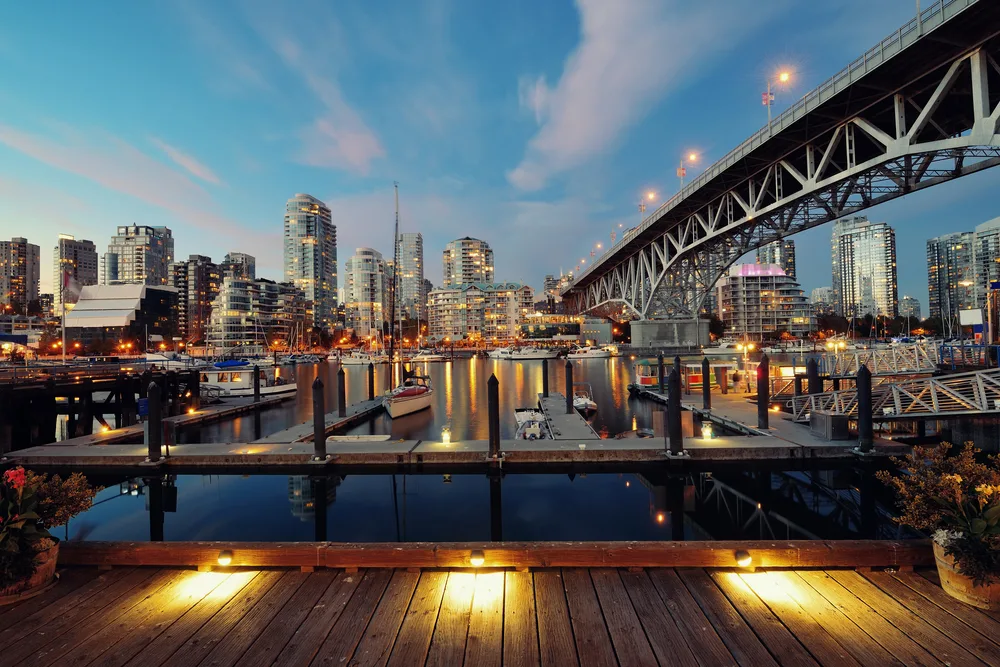
Songquan Deng/Shutterstock
Here are some of the most common questions people have asked to help pick the best time to visit Vancouver:
What is the rainy season in Vancouver?
It rains the most in Vancouver between October and March, but you can expect showers at any time of year.
What time of year is cheapest to go to Vancouver?
Winter is the cheapest time to visit Vancouver, but any time between mid-September and early May, you are bound to find good deals.
Is April a good time to go to Vancouver?
April is a beautiful time to go to Vancouver as the flowers are in bloom, the weather is warming up, and you can enjoy all sorts of outdoor activities without the crowds. Just make sure to bring an umbrella.
What month is the best to visit Canada?
If you are planning to visit Vancouver as part of a larger Canada trip, visit in September or October, when the foliage across the country is spectacular.
So, What’s the Best Time to Visit Vancouver?
Summer is the best time to visit Vancouver for good weather and plenty to do, but many people have the same idea. To beat the crowds and save money, visit in spring or early fall.



